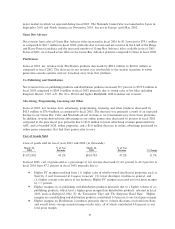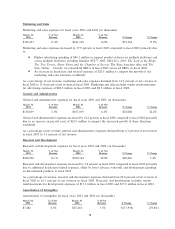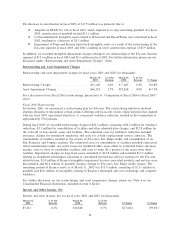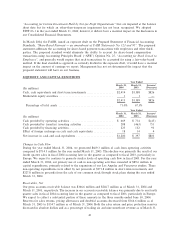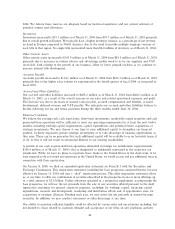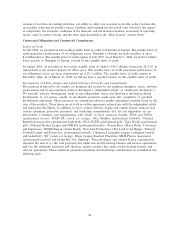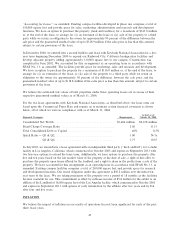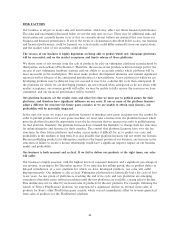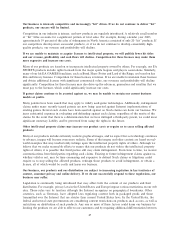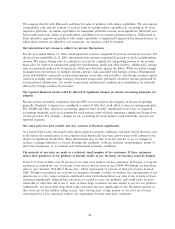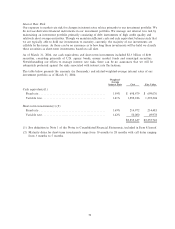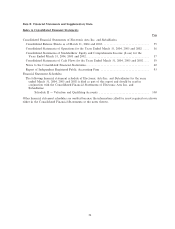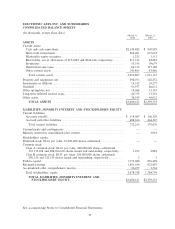Electronic Arts 2004 Annual Report Download - page 62
Download and view the complete annual report
Please find page 62 of the 2004 Electronic Arts annual report below. You can navigate through the pages in the report by either clicking on the pages listed below, or by using the keyword search tool below to find specific information within the annual report.Our business is intensely competitive and increasingly ""hit'' driven. If we do not continue to deliver ""hit''
products, our success will be limited.
Competition in our industry is intense, and new products are regularly introduced. A relatively small number
of ""hit'' titles accounts for a signiÑcant portion of total sales. For example, during calendar year 2003,
approximately 19 percent of the sales of videogames in North America consisted of only 20 ""hit'' products. If
our competitors develop more successful products, or if we do not continue to develop consistently high-
quality products, our revenue and proÑtability will decline.
If we are unable to maintain or acquire licenses to intellectual property, we will publish fewer hit titles
and our revenue, proÑtability and cash Öows will decline. Competition for these licenses may make them
more expensive and increase our costs.
Many of our products are based on or incorporate intellectual property owned by others. For example, our EA
SPORTS products include rights licensed from the major sports leagues and players associations. Similarly,
many of our hit EA GAMES franchises, such as Bond, Harry Potter and Lord of the Rings, are based on key
Ñlm and literary licenses. Competition for these licenses is intense. If we are unable to maintain these licenses
and obtain additional licenses with signiÑcant commercial value, our revenues and proÑtability will decline
signiÑcantly. Competition for these licenses may also drive up the advances, guarantees and royalties that we
must pay to the licensor, which could signiÑcantly increase our costs.
If patent claims continue to be asserted against us, we may be unable to sustain our current business
models or proÑts.
Many patents have been issued that may apply to widely used game technologies. Additionally, infringement
claims under many recently issued patents are now being asserted against Internet implementations of
existing games. Several such claims have been asserted against us. Such claims can harm our business. We
incur substantial expenses in evaluating and defending against such claims, regardless of the merits of the
claims. In the event that there is a determination that we have infringed a third-party patent, we could incur
signiÑcant monetary liability and be prevented from using the rights in the future.
Other intellectual property claims may increase our product costs or require us to cease selling aÅected
products.
Many of our products include extremely realistic graphical images, and we expect that as technology continues
to advance, images will become even more realistic. Some of the images and other content are based on real-
world examples that may inadvertently infringe upon the intellectual property rights of others. Although we
believe that we make reasonable eÅorts to ensure that our products do not violate the intellectual property
rights of others, it is possible that third parties still may claim infringement. From time to time, we receive
communications from third parties regarding such claims. Existing or future infringement claims against us,
whether valid or not, may be time consuming and expensive to defend. Such claims or litigations could
require us to stop selling the aÅected products, redesign those products to avoid infringement, or obtain a
license, all of which would be costly and harm our business.
Our business, our products and our distribution are subject to increasing regulation in key territories of
content, consumer privacy and online delivery. If we do not successfully respond to these regulations, our
business may suÅer.
Legislation is continually being introduced that may aÅect both the content of our products and their
distribution. For example, privacy laws in the United States and Europe impose various restrictions on our web
sites. Those rules vary by territory although the Internet recognizes no geographical boundaries. Other
countries, such as Germany, have adopted laws regulating content both in packaged goods and those
transmitted over the Internet that are stricter than current United States laws. In the United States, the
federal and several state governments are considering content restrictions on products such as ours, as well as
restrictions on distribution of such products. Any one or more of these factors could harm our business by
limiting the products we are able to oÅer to our customers and by requiring additional diÅerentiation between
47


